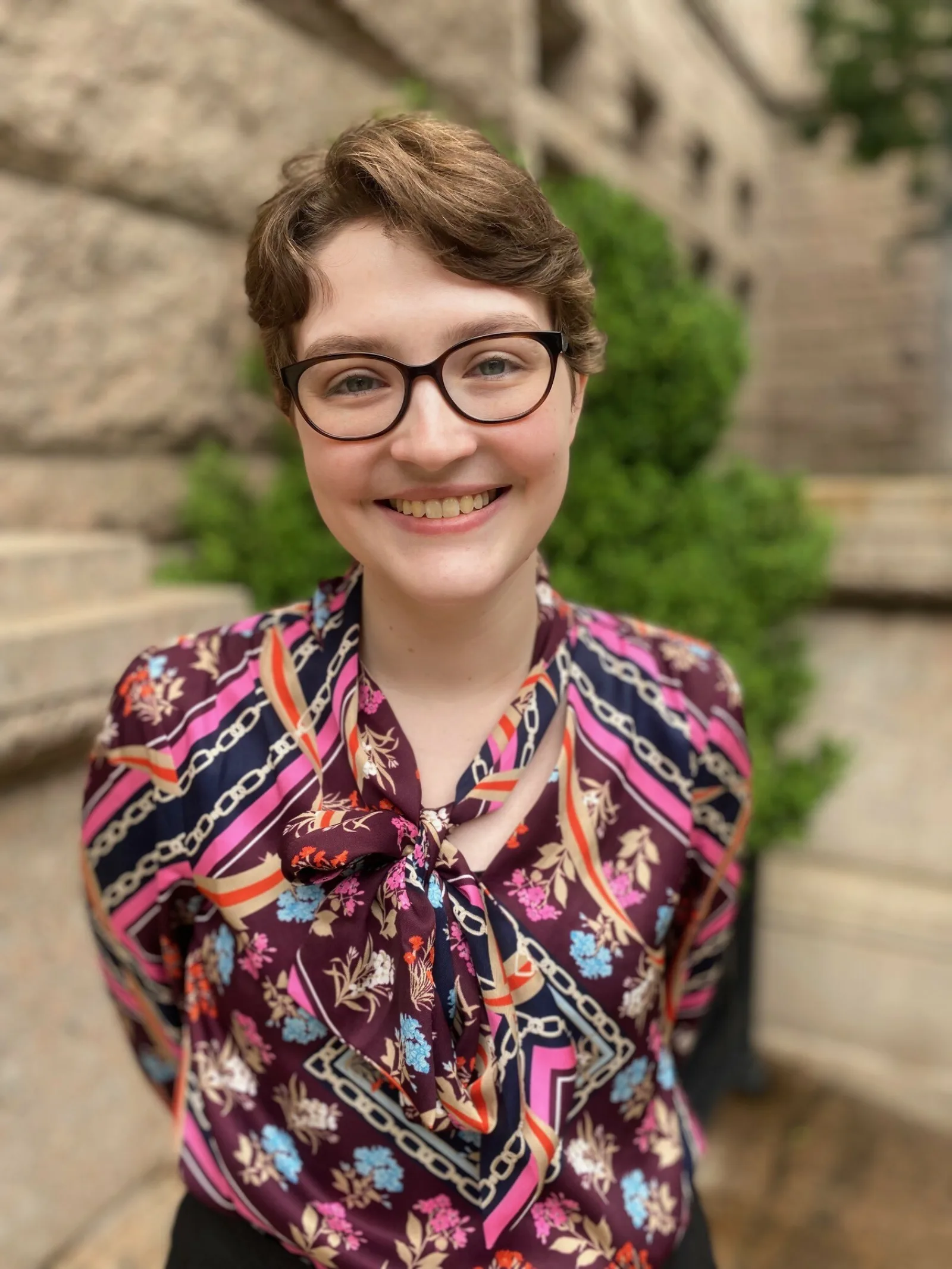In this edition of Meet the Staff, learn more about Caroline Carter and the critical role she plays in helping the Newberry secure funding for programs, collection needs, and more.
When did you start at the Newberry? How did you first hear about the library?
I have been at the Newberry since September of 2019, so I’m coming up on my five-year anniversary. I started as Donor Relations and Communications Coordinator, which was my first job out of college. I went to the University of Chicago, which is obviously not far away, but I hadn’t heard about the Newberry until after I graduated. In college, I thought I would go into education or go on to get a PhD because I have a love for linguistics and Spanish-language literature. Working in development specifically at the Newberry ended up being a good fit for me because it combined what I love about teaching and research—it’s about taking a potentially complex subject, making it easier to understand, and ultimately getting people interested in it.
I’m now the Grant Writer at the library, a position I started in September 2021. I love writing and think it’s a fun challenge to take a complex project and boil it down to a concise, persuasive funding proposal. This role allows me to dive deep into projects and do everything I can to get them the support and funds that they need.
What does the day-to-day of your job look like?
I spend a lot of time writing at my desk, which isn’t the most exciting. I would say, however, that this job is really about translation. It’s about talking to people, listening to what they’re saying, and making sure I really understand what they’re working on and how grant money would help them. I’m good at asking questions, and I think that’s a vital part of being a grant writer. When working on a proposal, I’m trying to figure out how to present this story in a way that is engaging, accurate, and informative and that answers questions readers might have before they even know they do. I love that I get to chat with a lot of people and run around the building asking “Hey, what’s happening and what are you working on?” A lot of people think grant writing is a solo endeavor, but it’s very social.
What grant are you most proud of securing?
The grant we just received from the National Endowment for the Humanities (NEH) that will allow us to digitize the Ayer Linguistics collection is something I’m so excited about! We’ve been looking to fund this project for nearly a decade. The NEH has a very rigorous application process and that meant doing lots of digging into the collection to be able to convey its history and importance. A lot of that work had already been done by my colleagues on the library services side, especially Will Hansen, the Roger and Julie Baskes Vice President for Collections and Library Services and Curator of Americana, and Analú López, the Ayer Librarian and Assistant Curator of American Indian and Indigenous Studies. They were such a great support and resource as I worked on this proposal, as was Jennifer Dalzin, the Director of Digital Initiatives and Services. I often start the grant-writing process by asking myself “why is this important?” In this case, I was able to answer that question easily. As I said earlier, I love linguistics. This collection is already such an amazing resource for linguists and communities working to revitalize Native languages. It’s so cool that now it will be digitized and available for many people to use and connect with.
Do you have a favorite item in the collection?
I don’t know if I have a favorite item in the collection, but I do have a favorite encounter with a collection item. I was in the Stacks building with Jill Gage, Custodian of the John M. Wing Foundation on the History of Printing and Bibliographer of British Literature and History, and Kim Nichols, Director of Conservation Services, looking at collection storage needs. While walking around, we happened upon an oversized test sheet of cover designs for the then-very popular Nick Carter detective novels from the late nineteenth to early twentieth century. My surname is obviously Carter. My great-grandfather was Frank James Carter, but everyone called him Nick, specifically because of the Nick Carter character. He worked for a large tire company, and since Carter is a common name, several of his coworkers also had the surname, Carter. They got nicknamed “Nick,” too, so people had to distinguish the Nicks by department, i.e. “Nick Carter from Plant C,” “Nick Carter from Sales,” etc.
Today, "Nick” is a family name for us even though my great-grandfather was technically named Frank. It’s a fun example of how pop culture influences everyday life, and it was a fun anecdote to share with Jill and Kim, who weren’t very familiar with the character. I also think it’s an example of how the Newberry not only preserves historical items but creates space for us to encounter these items together and share ideas in unexpected ways.
This story is part of the Newberry’s Donor Digest, Summer 2024. In this newsletter, we share with donors exciting stories of the work made possible by their generosity. Learn more about supporting the library and its programs.
